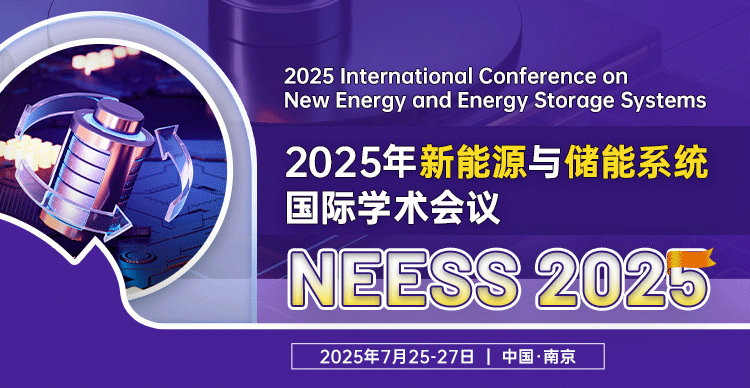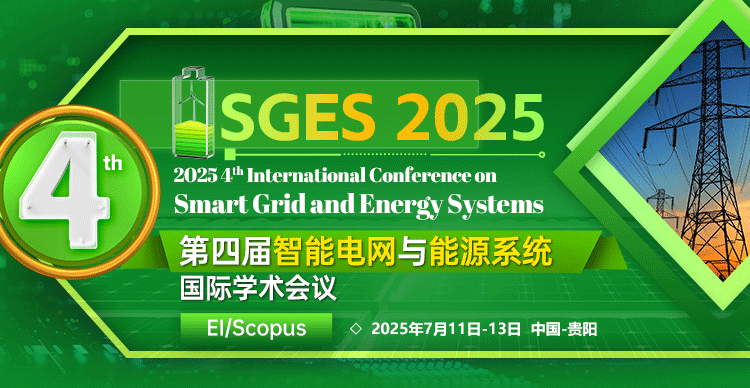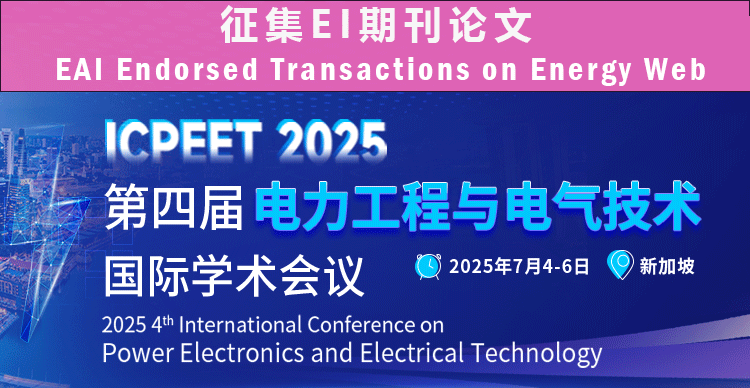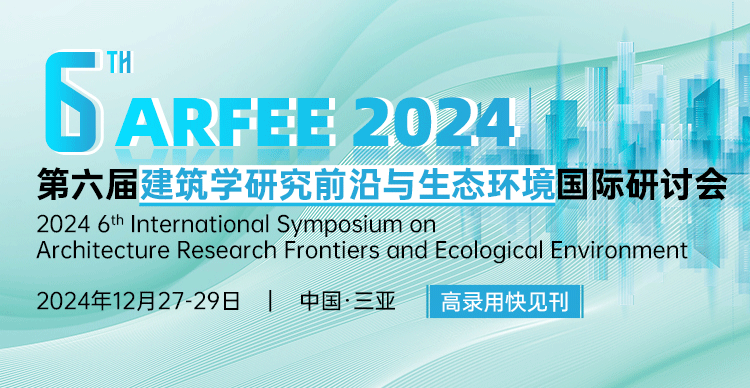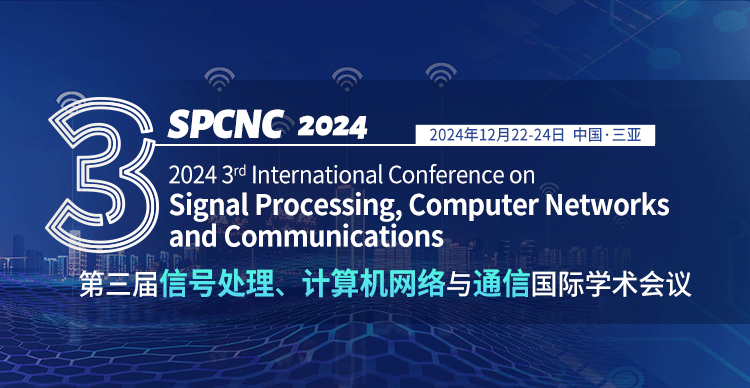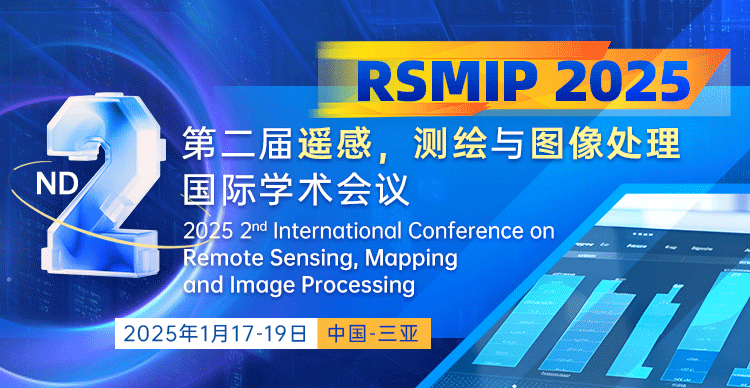第二届电力电子与人工智能国际学术会议
2025 2nd International Conference on Power Electronics and Artificial Intelligence
大会简介
第二届电力电子与人工智能国际学术会议(PEAI 2025)将于2025年1月17-19日于中国三亚召开。会议将围绕电力电子、人工智能等在相关领域中的最新研究成果,为来自国内外高等院校、科学研究所、企事业单位的专家、教授、学者、工程师等提供一个分享专业经验,扩大专业网络,面对面交流新思想以及展示研究成果的国际平台,探讨本领域发展所面临的关键性挑战问题和研究方向,以期推动该领域理论、技术在高校和企业的发展和应用,也为参会者建立业务或研究上的联系以及寻找未来事业上的全球合作伙伴。
组织单位
主办单位:中山大学
承办单位:中山大学电子与通信工程学院
往届报告嘉宾
Udaya Madawala教授, Fellow IEEE, 奥克兰大学,新西兰
1993年获得新西兰奥克兰大学(University of Auckland)电力电子博士学位。博士毕业后,他受聘于新西兰Fisher & Paykel Ltd,担任研发工程师,开发电机驱动新技术。1997年,他加入了奥克兰大学电气与计算机工程系,目前是一名全职教授,他专注于一些与V2G应用的无线电动汽车充电系统相关的电力电子项目。Udaya是IEEE Fellow和IEEE电力电子学会(PELS)的杰出讲师,在电力电子和能源领域拥有超过32年的行业和研究经验。
Yonghui Li教授, Fellow IEEE, 悉尼大学,澳大利亚
自2003年以来,他一直在澳大利亚悉尼大学电信卓越中心工作。现为悉尼大学电气与信息工程学院教授兼无线工程实验室主任。他是2008年澳大利亚研究理事会(ARC)伊丽莎白二世女王奖学金和2012年ARC未来奖学金的获得者。他因对协作通信技术的贡献而成为IEEE Fellow。
曾念寅副教授,厦门大学,中国
厦门大学仪器与电气工程系副教授。担任/曾担任Neurocomputing、Frontiers in Medical Technology和Evolutionary Intelligence的副主编,Computers in Biology and Medicine、Biomedical Engineering Online、Mathematical Problems in Engineering、Journal of Electronics & Information的编委Technology、Journal of Image and Graphics,以及Frontiers in Neuroscience和Frontiers in Medical Technology的客座编辑。曾担任多个与智能数据分析相关的顶级国际会议程序委员会委员。先后获得福建省高层次人才、厦门市骨干人才、厦门大学南强青年拔尖人才、省自然科学奖四项、发明创业成果奖等多项殊荣。中国发明协会、生物医学计算机、神经计算、中国科学仪器杂志特聘审稿人。
征稿主题
电力电子
电力电子
电力电子设备
电机驱动和变频器
系统集成
电力系统
建模与仿真
转换器和系统控制
电机物理理论分析
大型设备降噪技术
高频转换器及电源
无源元件和传感器
电子信号
电力系统及其自动化
高电压与绝缘技术
电力电子与电力传输
电力机械与电器
高级电磁学
MEMS元件技术
电子系统级设计
电子学和纳米电子学
外延和发光二极管
光纤和光纤设备
巨型区域微电子学
三维半导体器件技术
等相关主题......
人工智能
算法
图像处理
人工智能算法
模糊逻辑
计算机视觉和图像理解
信号和图像处理
语音和自然语言处理
计算学习理论
信息检索和融合
混合智能系
机器学习
自然语言处理
人工智能建模与仿真
普及计算和环境智能
数据挖掘和机器学习工具
应用于物联网的人工智能
智能数据库系统
智能和人工智能控制
智能自动化
神经网络和复杂系统
模式识别和逻辑程序
微控制器技术
启发式和人工智能规划策略和工具
智能控制
等相关主题......
论文出版
会议论文投稿
所有的投稿都必须经过2-3位组委会专家审稿,经过严格的审稿之后,最终所有录用的论文将由Conference Proceedings出版,见刊后提交至EI Compendex, Scopus检索。
Welcome to PEAI 2025
The 2025 2nd International Conference on Power Electronics and Artificial Intelligence
The 2025 2nd International Conference on Power Electronics and Artificial Intelligence (PEAI 2025) will be held on January 17-19 2025 in Sanya China.
PEAI 2025 is to bring together innovative academics and industrial experts in the field ofPower Electronics and Artificial Intelligenceto a common forum.
The primary goal of the conference is to promote research and developmental activities in Power Electronics and Artificial Intelligence and another goal is to promote scientific information interchange between researchers developers engineers students and practitioners working all around the world. We sincerely invite you to participate in PEAI 2025 and look forward to seeing you in Sanya!
Important Dates
Full Paper Submission Date: November 10 2024
Notification Date: December 15 2024
Registration Date: December 29 2024
Conference Dates: January 17-19 2025
Committee
· Honorary Chair
Yonghui Li
The University of Sydney Australia
·Conference Chair
Yuan Yan Tang
University of Macau China
Congduan Li
Sun Yat-sen University China
· Technical Program Committee Chair
Nianyin Zeng
Xiamen University China
Yang Han
University of Electronic Science and Technology of China China
Pascal LORENZ
University of Haute Alsace France
·Local Chair
Zhiyong Luo
Sun Yat-sen University China
MingZhi Mao
Sun Yat-sen University China
·Publication Chair
Qiang Yang
Nanjing University of Information Science and
Technology China
Xuehe Wang
Sun Yat-sen University China
Parikshit N. Mahalle
Vishwakarma Institute of Information
Technology Pune
· Program Committee
Prof. Yiming Zhang Fuzhou University China
Prof. Zhihong Tian Guangzhou University China.
Prof. Warwick Powell Queensland University of Technology Australia.
Prof. Chuan Qin University of Shanghai for Science and Technology China
Prof. Osama Mohammed Florida International University USA
Prof. Hang Yu Shanghai University China
Prof. Panos Pardalos University of Florida USA
Prof. Gheorghe GrigorasTehnical University of Iasi Ia?i Romania
Prof. Robert M Cuzner University of Wisconsin-Milwaukee USA
Prof. Hua Li Nanyang Technological University Singapore
Prof. Hartmut Hinz Frankfurt University of Applied Sciences Germany
Prof. Joe Dong The University of Sydney Australia
Prof. James Marco University of Warwick UK
Prof. Tao Lin Wuhan University China
Prof. Wenzhong Guo Fuzhou University China
Prof. Yudong Zhang University of Leicester UK
Prof. Xiaoli Li Nanyang Technological University Singapore
Prof. Tianrui Li Southeast Jiaotong University China
Prof. Parikshit Mahalle Aalborg University India
Prof. Assaf Schuster Israel Institute of Technology Israel
Assoc.Prof. Sohrab Mirsaeidi Beijing Jiaotong University China
Assoc.Prof. Bin Xiang Xi‘an Jiaotong University China
Assoc.Prof. Zhiwen Wang Dalian Maritime University China
Assoc. Prof. Amr Tolba Computer Science Department King Saud University Saudi Arabia
Assoc. Prof. Cheng-Yuan Ho National Taiwan UniversityTaiwan China
Assoc. Prof. Alessandro Romagnoli Nanyang Technological University Singapore
Assis. Prof. Hamid Reza Ashorynejad Buein Zahra Technical University Iran
Assis. Prof. Syed Abdul Mujeer Lakireddy Bali Reddy College of Engineering India
Dr. Julia Qing Zheng California Baptist University USA
Dr. Md Rafiqul Islam University of Technology Sydney Australia
Call For Papers
The topics of interest for submission include but are not limited to:
Track 1:Design of artificial intelligence in power electronics
·Power grid modeling and simulation
·Smart grid
·Digital twin technology
·Renewable energy systems
·Urban energy Internet
·microgrid
·Data mining
·Circuit design and optimization
·Fuzzy logic
·Evolutionary algorithm
·Swarm intelligence algorithm
Track 2:Maintenance of artificial intelligence in power electronics
· Signal processing
· Data mining
· em
· Power grid supervision
· Algorithm optimization
· Anomaly detection
· Pattern recognition
Track 3:Control of artificial intelligence in power electronics
· em
· Fault identification
· Load prediction
· Power grid intelligent decision aid
· Power system regulation
· RUL prediction
· Neural network
Publication
All papersboth invited and contributed the accepted papers will be published for inclusion into Conference proceedings with meeting scope and quality requirements and also submitted to EI Compendex and Scopus for indexing. All conference proceedings paper can not be less than 8 pages.
2024:ACM DL I EI I Scopus
Note: All submitted articles should report original research results experimental or theoretical not previously published or under consideration for publication elsewhere. Articles submitted to the conference should meet these criteria. We firmly believe that ethical conduct is the most essential virtue of any academics. Hence any act of plagiarism or other misconduct is totally unacceptable and cannot be tolerated.



